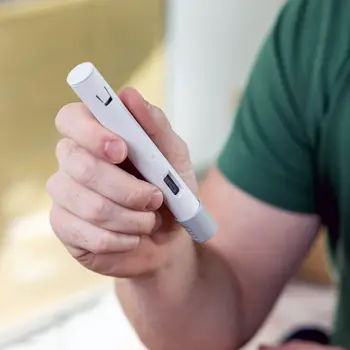A Comprehensive Overview of Empty Calories
Convenience often trumps nutrition when it comes to our food choices, leading to an overconsumption of foods with empty calories.
Although they are easily accessible, these calories contain almost no nutritional value and have little benefit for the body. Not only do they lack essential nutrients, but consuming an excess of empty calories also contributes to various health issues and diseases.
Get prescription weight loss medication online.
Find out if you're eligible for GLP-1s, and get started on your weight loss journey for as low as $75/month.


What are Empty Calories?
Empty calories are found in food and beverages that provide very little nutritional value and lack essential vitamins, minerals, and fiber.
These calories typically come from added sugars, processed oils, solid fats, and refined grains.
The Impact of Empty Calories on Your Health
Weight gain
Empty-calorie foods are high in added sugars and unhealthy fats. These calorie sources may provide energy, but they won’t make you feel full or satisfied after eating them, which leads to overconsumption.
If you consistently eat in a calorie surplus without physical activity, you will start gaining weight. Left unchecked, excessive weight gain can develop into obesity.
Nutrient deficiencies
If your diet primarily consists of foods with empty calories, you deprive your body of essential vitamins and minerals. This may lead to nutrient deficiencies, like a shortage of iron, vitamin D, vitamin B12, or calcium.
A lack of these nutrients can lead to additional health issues like anemia, muscle weakness, and impaired wound healing.
Poor dental health
The high sugar content of some empty calorie foods can contribute to dental issues like tooth decay and cavities.
If left unchecked, this can cause severe pain and discomfort that can affect your daily life.
Insulin resistance
Consistently consuming foods high in sugar can cause the body to become insulin resistant. Insulin is a hormone that helps the body to break down sugar – glucose.
When the body becomes insulin resistant, it struggles to regulate sugar levels and will start to store excess blood sugar as fat which may contribute to weight gain.
Inflammation and oxidative stress
Many empty calorie foods are associated with promoting inflammation and oxidative stress in the body.
These foods can generate excess free radicals — unstable molecules that can damage cells in the body — which may trigger an inflammatory response.
Consistently being exposed to free radicals also puts the body under oxidative stress, which develops when you don’t have enough antioxidants available to eliminate toxic molecules.
Oxidative stress can increase your risk of developing secondary health conditions like diabetes, cancer, and neurodegenerative diseases like dementia.
Increases cholesterol
Empty-calorie foods high in unhealthy fats can raise your cholesterol levels.
Consistently high cholesterol may lead to cardiovascular problems like heart disease, stroke, and hypertension.
Key Point: Do Empty Calories Lead to Weight Gain?
Empty calories don’t contain much nutritional value and won’t make you feel full after consuming them.
Eating a diet high in these foods means that your empty calorie intake is likely higher than it should be, which leads to weight gain.
To promote weight loss, it’s best to follow a diet that contains nutrient-dense foods and ensure that you are in a calorie deficit — meaning you consume fewer calories than you need to maintain your current weight. Increasing physical activity is also recommended.
Identifying Hidden Sources of Empty Calories
Empty calories can be difficult to spot if you don’t know what to look for. Recognizing them on nutritional labels is essential for making better dietary choices and reducing your food consumption.
Read nutritional labels on food
Before buying anything, examine the label attached to the product to determine its nutritional value.
Note the serving size, added sugars, number of unhealthy fats, and if the product contains any refined grains.
Be careful not to buy too many products that are high in sugars and fats, because this may indicate empty calories.
Check the ingredients list
Ingredients are typically listed in descending order based on their weight in the product.
Look out for ingredients like high fructose corn syrup, molasses, white flour, and hydrogenated oils near the top of the list.
If these ingredients are some of the first you notice, it means that the product contains a large amount of them, and it’s more likely that the product is filled with empty calories.
Know which foods contain empty calories
Knowing which foods contain empty calories is essential for making better dietary decisions. These typically include:
Soft drinks
Sugary drinks like iced tea
Sweetened fruit drinks like juice or lemonade
Candy
Fast food
Processed snacks like potato chips
Breakfast cereals containing added sugar
Frozen desserts
Fried foods
Sauces and dressings
It’s not necessary to cut these foods out of your diet completely. You can still consume them in moderation as part of a balanced diet without harming your health.
Key Point: How Many Empty Calories Can I Eat?
The amount of empty calories you can consume depends on several factors, including your age, sex, weight, and overall activity level.
In general, it’s recommended to limit your intake of empty calories as much as possible. The American Heart Association (AHA) recommends that you not exceed the value of six teaspoons (25 grams) of sugar per day for women and nine teaspoons (38 grams) for men.
Although these aren’t absolute dietary guidelines, this generally means you should avoid eating more than 300 empty calories per day — especially if you’re not physically active.
Make Smart Substitutions and Choose Nutrient-Dense Foods
Choosing healthy foods with a higher nutritional value is key for managing your empty calorie intake. To do this, it’s important to understand what a nutrient-dense option is and how you can replace empty calories with them.
What is the difference between empty and nutritional calories?
The difference between empty and nutritional calories lies in their value for the body.
Nutritional calories usually contain vitamins, minerals, protein, and healthy fats, which are all essential for helping the body function optimally.
These calories also support bodily functions — like wound repair and maintaining a strong immune system — while providing sustained energy that doesn’t cause blood sugar spikes.
Which foods are nutrient-dense?
Nutrient-dense foods provide the body with essential vitamins and minerals. Common examples include:
Fruits and vegetables
Whole grains
Lean proteins, like poultry and fish
Nuts
Seeds
Low-fat dairy products
These foods are typically unprocessed and packed with antioxidants and other nutrients that are essential for maintaining a healthy body.
A diet composed of nutrient-dense whole foods helps you to ensure that you’re getting the nourishment you need while managing your calorie intake.
Can I replace empty calorie foods with nutrient-dense options?
You can replace almost any empty calorie food with a nutrient-rich option to ensure a well-balanced and healthy diet.
For example, you can replace refined grains like white bread with whole food options like a wheat loaf or quinoa.
You can also substitute fried snacks with homemade popcorn or roasted chickpeas. Sugary desserts like ice cream can be swapped for fresh fruit or low-fat yogurt topped with nuts and seeds.
There are many other options that will help you improve the nutritional value of your diet.
Consistently making these small changes is essential for maintaining a healthy lifestyle, promoting weight loss, and keeping empty calories at bay.
Ready to achieve your weight loss goals?
Shed pounds with GLP-1 medication prescribed online by licensed healthcare providers for as low as $75/month.


Practical Ways to Reduce Empty Calorie Intake
By making small changes in your diet, you can replace empty calories with healthier alternatives that provide you with the essential nutrients you need to support your health goals.
Rethink your liquids
Consider replacing sugary beverages like soda, energy drinks, and sweetened juices with healthier options like water or low-calorie cordials.
If you enjoy drinking coffee in the morning, try to reduce the amount of sugar you add to your cup.
You may want to avoid sweetened creamers or switch to dairy-free alternatives like almond or oat milk.
Practice mindful eating
Mindful eating involves paying attention to your hunger and fullness cues. Slowing down during meals and chewing your food for longer can help you to listen to your body’s signals too.
Practicing these eating habits can help reduce overeating and mindlessly consuming empty-calorie foods and snacks.
Implement portion control
Being conscious of your portion sizes can help you avoid consuming too many empty calories.
You can implement portion control by using smaller plates and bowls to visually trick your brain into feeling satisfied with less food.
Another method is to fill your plate with nutrient-dense foods like lean proteins, vegetables, and whole grains while keeping empty-calorie options for occasional treats.
This can help you create and maintain a healthier, more balanced diet while avoiding excessive empty calories.
Embrace meal prepping and cooking
If you want to control your empty calorie intake, prepping and cooking at home is a great option.
Doing this allows you to choose nutrient-dense ingredients while regulating the amount of added sugars and unhealthy fats.
You can also plan your meals ahead of time, cook in batches, and pack nutritious lunches and snacks to avoid relying on fast foods.
Avoid alcoholic drinks
Alcoholic beverages can be a significant source of empty calories, so moderation is key.
You can limit your alcohol intake by choosing healthier options — like light beer, spritzers, or low-calorie mixers — or you can avoid it completely. The choice will depend on your individual circumstances and calorie goals.
Remember that excessive alcohol consumption not only contributes to empty calories but it also increases the risk of developing other health conditions like liver disease.
Where Can I Learn More About Healthy Eating Habits?
If you’re struggling with unhealthy eating habits or want to know more about empty calories, LifeMD can help.
Licensed medical professionals can assist you with information about calorie intake, weight management strategies, and eating better — all from the comfort of your own home. You may be interested in enrolling in the LifeMD Weight Management Program.
Enrolling in the program means you’ll be working closely with licensed clinicians who will design a personalized plan to help you lose weight. Start your journey to a healthier life with LifeMD.












